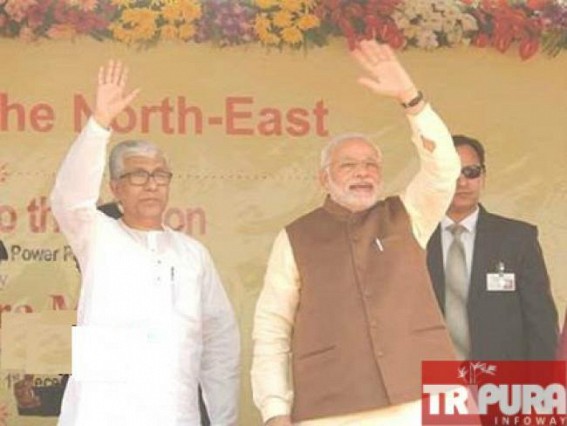Pradip Chakraborty

AGARTALA, May 31 (TIWN): Indian Prime Minister Mr Narendra Modi’s visit will be considered a very significant one. His every move will be judged to know how his politics is different and will be helpful to improve India's relationship with its neighbours in the context of a change of mind and heart.Indian Premier is scheduled to arrive in Dhaka on a two-day visit on June 6. It to be mentioned that Indian Prime Minister Narendra Modi is not coming to Bangladesh in the best of times. The people are reeling under the wave of shocks and grief for the brutalities and killing of thousand of migrant workers who wanted to flee poverty but fell prey to illegal traffickers.The leader of the biggest democracy is arriving in Bangladesh when democracy is gasping for breath. Indian Premier 's visit will not be evaluated by how much concession India gets but also from how much fair India is to be helpful for the people of Bangladesh. Other just demands like sharing of Teesta water are also receiving his serious attention. In spite of Modi's sincere efforts it is not likely that the Teesta river water sharing agreement will be signed during Modi's presence in Bangladesh.
This agreement would have been greeted by the people of Bangladesh as the most encouraging new development. But gestures of the Indian Prime Minister to do justice to Bangladesh are admirable and seen as willingness on his part to meet the just demands of the people of Bangladesh in the spirit of cooperation in the liberation war.
Tripura's economic developments are dependent on Bangladesh's co-operation as Bangladesh helped Tripura with transshipment of OTPC Palatana Plant equipments, allowing rice shipments via Ashuganj Port.
Water sharing being a life and death issue for the people of Bangladesh, it has been a major hurdle in developing improved and justrelationship between India and Bangladesh since inception of Bangladesh.Government to government relations cannot be enough for any just and durable relationship between the two countries. Mr Modi is not unaware of the misgivings and misunderstandings that grew among our people over the years in the relationship between the two countries.
India relied on the government without caring that the people also count. Bangladesh's strongest foundation for its special relationship with India is the enormous help India gave us for Bangladesh liberation war.Liberation war was not simply for breaking up Pakistan but to have an independent democratic Bangladesh and save
themselves from the repression of authoritarianism. It has been the general expectation of Bangla people that as successful democracy,
India's help in the liberation war will be genuinely translated into her firm commitment for the realization of Bangla peoples' dream of a democratic Bangladesh. As the nearest and biggest neighbour, India is heavily weighed in the political calculations of Bangladesh – both internal and bi-lateral.
The foreign press often took a critical view of India for exerting too much influence on our internal politics as they saw it. Despite all complexities and disaffection in politics and public life, the visit of Prime Minister Modi is most welcome to all as a people's leader who has come to power with massive popular support giving rise to great hopes not only in India but also outside including neighbouring countries for change. He is seen as a pragmatic leader of strong character who did not hesitate to invite President Obama as a special guest which was not so popular a move with some leftist groups. He is uncompromising in his fight against corruption in the interest of clean government.
Mr Modi enjoys vast respect among the people of Bangladesh for the kind of changes he represents. Most importantly, his rise in Indian politics has brought downfall of the dynastic politics of Congress era. If opportunity is created or sought no small country's internal politics can remain uninfluenced from outside.
When India is being seen as a friend of liberation war, India's help in the growth of democracy in Bangladesh would have been a legitimate interest. The expectation is high that under the leadership of Mr Modi, a positive horizon will be opened up for the realization of people's democratic aspirations as expressed through the liberation war.
The people of Bangladesh are pleased that Mr Modi with his dynamic leadership, moved forcefully to implement the Land Boundary Agreement which remained unimplemented for 41 years. In absence of an agreed boundary line the affected people suffered for long 68 years as non-citizens.
Indian Premier has already met the leaders of Bhutan, Nepal and Sri Lanka as part of his government's policy to strengthen relations with neighbours. It is seen that Mr Modi is following a new path for cultivating good and just relationship with India's neighbours accepting sovereign equality as the basis. While in the past India used to see itself as a dominating power (big brother) to be reckoned with.
Sharing of water of Teesta will be a very happy development for Bangladesh. Bangladesh has been mostly helpless for too long in the past in its struggle to get fair share of water from upstream rivers.
So water sharing has to be considered in the larger context. The list of proposed deals which both the countries will discuss during his visit includes some every sensitive issues for Bangladesh like amended India-Bangladesh Trade Agreement and Amended Protocol on Inland Water on Transit and Trade. Deals on coastal shipping, maritime security, a second line of credit of US$2 billion and Dhaka-Shillong-Guwahati and Kolkata-Dhaka-Agartala bus services.
- 'Intolerable.....' Corporators Lodged FIR against Madhabi Biswas over 'Insane Video' on social media targeting PM & Mayor
- Blood Donation Camp Organized in Sipahijala District
- Yuvrajnagar Panchayat Samiti Chairperson's Husband Denies Molestation Allegations
- CPIM Submits Memorandum for Fair Voter List Revision
- 23 Panchayats in Gauranagar Block Receive Computers, Printers, and LED TVs



